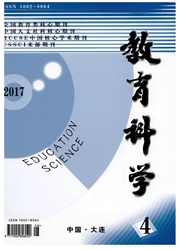
欢迎您!东篱公司
退出

 中文摘要:
中文摘要:
从劳动力流动制度的角度看,我国90年代以来教育收益率逐年上升的原因在于,一方面我国劳动人事制度改革增强了受更多教育者的工作努力程度,进而教育的生产效应得到释放,另一方面我国劳动力市场逐渐从分割走向统一,增强了劳动力的流动性,使教育的配置效应得以充分发挥。
 英文摘要:
英文摘要:
From the 1990s, the rate of return to education in China has been on the rise. This paper analyses this phenomenon from the labor mobility system perspective, on one hand, the reform of employment system makes the more educated work harder, which extends the production effect of education, and on the other hand, China's labor market becomes more and more united , extending the allocating effect of education.
 同期刊论文项目
同期刊论文项目
 同项目期刊论文
同项目期刊论文
 期刊信息
期刊信息
